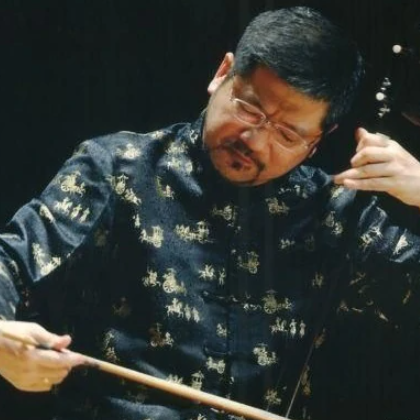license
Organized by 辞惘 on 2022-04-14

Permit, Huqin master, broke through and innovated the superb Huqin playing techniques that predecessors could not achieve ① The first Huqin two-tone melody playing method, which made up for the blank history that the Huqin could not play two-tone harmony. ② Expanding the position to more than four octaves solves the problem of the vocal range of difficult songs. ③ Create a fast push-pull lianton bow with strong granularity and a clear and bright high-position artificial overtone.
The license that has been listed as the world's first-class performer is from Nanjing. He graduated from the Central Conservatory of Music in Beijing in 1982 with excellent results. He has successively studied erhu and piano with famous teachers such as Sima Jiezi, Lan Yusong, and Shi Dazheng. In 1983, he was the erhu chief of the Central Chinese Orchestra. In 1987, he held his first solo Huqin recital in Beijing Concert Hall conducted by Yan Huichang / Concerto of the Central Chinese National Orchestra, and successfully premiered the Erhu Concerto "Mo Chou Nu Fantasia" (composed by He Zhanhao / He Zhanhao), commissioned by Xu Xu. Song), Erhu and the large-scale national orchestra "Fantasy" (Yan Huichang).
In 1986, as a music supervisor, he was awarded the title of honorary citizen of Houston with a Chinese artist delegation visiting the United States. In 1996 and 1999, when he toured the United States as a soloist, he won the Artist Achievement Award from the honorary mayor of Baton Rouge and the mayor of New Orleans for two consecutive times. From 1991 to 1997, he was employed as a special researcher by the Chinese Department of the Social Science Research Center of Waseda University, Japan. In 1991, the Licensing Huqin Research Association was established in Tokyo. From 1999 to 2000, he was a visiting professor at the School of Music, Lewis Anna State University (LSU), while studying JAZZ. Since 2001, he has been a member of the "Silk Road" music group founded by Yo-Yo Ma. In 2004, he became a visiting professor at the Central Conservatory of Music in Beijing.
Similar artist
He Chaobo was born in a Sichuan opera family. His father was a piano player and his mother was a Sichuan opera actress. Famous Huqin performer, chief of Chengdu Ethnic Orchestra, national first-class actor.
read >>
Wang Yijing, young Huqin player, teacher of the Department of Folk Music of Xinghai Conservatory of Music, member of Erhu Professional Committee of Chinese Musicians Association, graduated from the Central Conservatory of Music Erhu master degree.
read >>
Shan Danfeng, a native of Gongzhuling City, Jilin Province, China, a young huqin performer, a young film and television actor, a member of the Erhu Society of the Chinese Musicians Association, a master of banhu art from the Central Conservatory of Music, and a professional teacher of erhu and banhu in the Art College of Yantai University.
read >>
Wang Shaoqing, a Peking Opera pianist. A native of Yancheng, Jiangsu, he was born into a family of pear orchards. His father Wang Fengqing is a descendant of Wang Guifen, his uncle Wang Yaoqing is a master of Tsing Yi, and his younger brother Wang Youqing is also a famous Peking opera actress.
read >>
Shen Cheng is a famous huqin player. In 1988, he entered the China Conservatory of Music as a graduate student under the tutelage of Professor Liu Mingyuan. He studied Gaohu and Jinghu with the famous Guangdong musician Gan Shangshi and Jinghu performer Zhang Suying, and studied Chinese instrumental composition techniques with Professor Huang Xiaofei. Graduated in 1990 and became China's first Banhu professional master.
read >>
Involving musical instruments
It is popular all over the Inner Mongolia Autonomous Region, especially in Horqin and Zhaowuda League in the east.
Erhu (Pinyin: Erhu) originated in the Tang Dynasty, called "Xiqin", and has a history of more than a thousand years. It is a traditional Chinese stringed instrument. Erhu, or Erxian Huqin, also known as "Nanhu" and "Omzi", is one of the main bowed and stringed instruments (wiping strings) in the Chinese national musical instrument family.
Involved portfolio
Involved news
Organized by 雾凇 on 2022-12-15
The 28th "Autumn of Chengdu" Chengdu International Music Season "String Charm West Shu" He Chaobo's works and Hu Qin special concert was played in Chengdu City Concert Hall on the evening of 13th.
read >>
Organized by 一口泡芙 on 2022-11-10
On November 3, the "Bow-Chords of Huqin -- A Concert of Huqin Masters", planned by the Professional Committee of Huqin, was staged at the Concert Hall of the National Center for the Performing Arts. With more than ten classical pieces, it recalled the century-old development of Huqin, presenting a new pattern and atmosphere of the new era.
read >>
Organized by 黑猫不是喵 on 2022-10-27
The Professional Committee of Hu Qin specially planned and launched the "Bow String Chanting Chinese Chapter - A Gathering Concert of Hu Qin Masters", which will be held in the Concert Hall of the National Grand Theater on November 3.
read >>
Organized by 氯化钠 on 2022-07-21
In order to promote national music and inherit Huqin culture, on July 18, 2022, the inaugural meeting of Qingdao North District Huqin Association was grandly held in the multi-functional hall on the fifth floor of Xingye Building, and all members of the association attended the meeting.
read >>
Organized by 雨童 on 2022-06-15
Folk drum artists have a saying: Dou Mi suona, Dan Mi Huqin. That is to say, if you learn to play the suona, you can master it after eating a bucket of rice, and if you learn to play the huqin, you need to eat a load of rice. It shows that learning to play the huqin is not achieved overnight, it takes a lot of effort.
read >>

 渝公网安备 50010702504639号
渝公网安备 50010702504639号